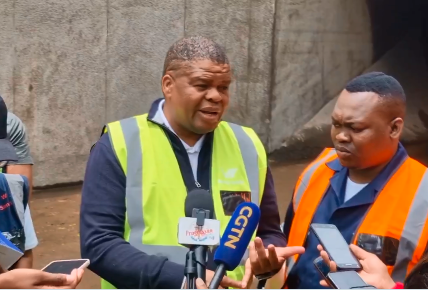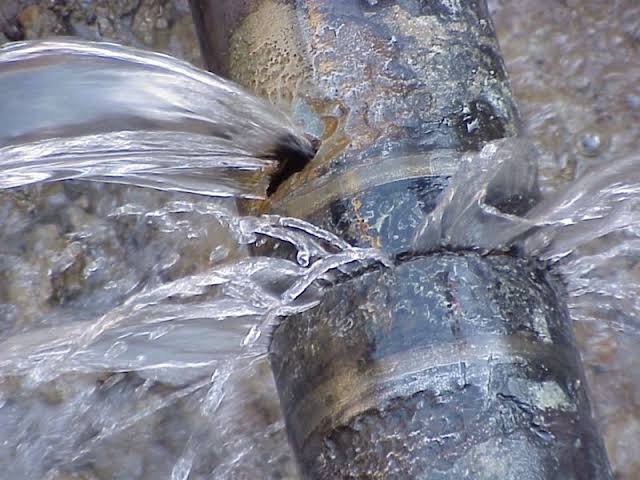

Deputy Minister Mahlobo: Gauteng municipalities must improve water infrastructure to avoid unnecessary leaks! Deputy Minister of Water and Sanitation, David Mahlobo, has highlighted that addressing water leakages in Gauteng could significantly ease the province’s ongoing water crisis.
Speaking at the Lesotho Highlands Tunnel in the Free State on Friday, Mahlobo revealed startling statistics about water wastage and urged municipalities to prioritize infrastructure repairs.
Billions of Litres Wasted Daily
Mahlobo noted that of the 5.1 billion litres of water supplied daily to Gauteng by Rand Water, approximately 2.5 billion litres—nearly half—are lost due to leaks in underground pipes and within communities.

“These figures are alarming,” Mahlobo said, adding that fixing these leaks would go a long way in resolving the province’s water shortages without the need to increase its water allocation.
Focus on Infrastructure Over Allocation
The Deputy Minister dismissed suggestions to increase Gauteng’s water supply, calling such a move wasteful and irresponsible given the current levels of leakage.
“There is only one solution. In Gauteng, Rand Water gives them more water than they need, but the water doesn’t arrive at the citizen, and the citizens are justifiably angry,” Mahlobo emphasized.
The focus, he said, should be on improving water infrastructure to ensure that the water already allocated to the province reaches households efficiently and without unnecessary loss.
Municipalities Under Pressure to Act
Mahlobo placed much of the responsibility for resolving the issue on Gauteng’s municipalities, urging them to take immediate action to repair and upgrade water systems.

“Municipalities in Gauteng must improve their water infrastructure to avoid unnecessary leaks,” he said, adding that government support would be available for such initiatives but that local administrations must show accountability and urgency.
He also pointed out that poorly maintained infrastructure not only wastes water but also drives up costs for municipalities and residents, who bear the financial burden of this inefficiency.
The Role of the Lesotho Highlands Water Project
Mahlobo’s remarks came during a visit to the Lesotho Highlands Tunnel, a crucial part of the Lesotho Highlands Water Project. This system transports water from Lesotho to South Africa, including Gauteng, and has played a key role in supplying water to the province.
While the project ensures a steady flow of water, Mahlobo stressed that its effectiveness is undermined by internal inefficiencies such as leaks, mismanagement, and lack of proactive maintenance in South Africa’s distribution networks.
Anger Among Gauteng Residents
Residents in Gauteng have grown increasingly frustrated with water shortages, which often result in dry taps, rationing, and water restrictions. Many have called on the government to address systemic issues rather than implementing temporary measures such as throttling water supply or instituting restrictions.
“These water shortages are unacceptable,” one Johannesburg resident said. “If they’re losing billions of litres a day, it’s not a shortage—it’s negligence.”
A Call for Accountability and Action
Mahlobo’s comments have reignited the conversation around water management in Gauteng. Experts and civic organizations have called for more transparency and accountability from municipalities, as well as a clear plan to address the province’s water challenges.
Water management experts argue that fixing leaks is a cost-effective and environmentally sustainable way to improve supply, especially as South Africa grapples with increasing water demand and climate-related challenges.

Long-Term Solutions Needed
While repairing leaks is an immediate priority, Mahlobo acknowledged that long-term planning is also necessary. This includes regular maintenance schedules, investment in modern water-saving technologies, and public education campaigns on responsible water use.
Additionally, collaboration between provincial governments, municipalities, and private stakeholders will be essential to fund and implement these solutions effectively.
Conclusion
The water crisis in Gauteng is a pressing issue, with billions of litres lost daily due to leaks. Deputy Minister Mahlobo’s call to action highlights the urgent need for municipalities to prioritize infrastructure repairs over increasing allocations.
Addressing these inefficiencies will not only alleviate shortages but also save costs and preserve a critical resource for future generations. Residents and officials alike hope that this renewed focus on fixing leaks will bring lasting solutions to the province’s water woes.
#Deputy #Minister #Mahlobo #Gauteng #municipalities #improve #water #infrastructure #avoid #unnecessary #leaks



